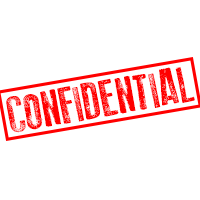There are ways to limit who knows the secrets of your trade that do not require obtaining expensive patents, trademarks, and copyrights granted by the government. Protect the information that makes your company unique by following some of these tips for your most confidential information.

You may have business secrets that you want to hide from the general public and your competitors. Some of the legal mechanisms offering protection are trademarks, patents, and copyrights. All are forms of protective licenses granted by the government, but they take time and money to obtain.
Not all secrets fall neatly into a category that can get such a license. There may also be legitimate reasons for not seeking a license, but there are still ways to limit who knows about your valuable secrets. Two terms often used to identify them are “proprietary information” and “trade secrets.”
Trade Secrets
If you own your company, it’s your call on what information you want to protect. Most trade secrets consist of a formula, design or process that’s unique to your business. To qualify as a legally protected trade secret in most jurisdictions, the following three criteria must be met:
- The information must enable a current or future financial benefit
- The information is unknown to the general public, which makes the financial benefit possible
- The information is protected by the owner using all reasonable means
There are significant differences between patents and trade secrets, and both have advantages and disadvantages. One way to understand this is by taking a look at two of the most famous trade secrets in the United States – the formulas for Coca-Cola and Kentucky Fried Chicken.
While some assume these formulas are patented, they aren’t. A patent is disclosed to the world and has an expiration date. During the effective period of the patent, you have exclusive rights to its benefits. Once the patent expires, anyone can legally copy your product and sell it. If Coke and KFC had patented their recipes, the patents would have expired long ago and there could be thousands of copycats profiting from them.
Trade secrets are never disclosed and never expire. They remain secret as long as they are protected by the holder. Unlike a patent, a trade secret carries no defined period of exclusive use. So if a trade secret is discovered through legal means, anyone can use it. In the case of Coke and KFC, their formulas could likely be discovered by chemical analysis and reproduced by other companies.
Legal Remedies
It’s a federal crime to steal a commercial trade secret, and penalties apply to two types of activity:
1) Theft of a trade secret of a product in interstate or international commerce that harms the secret’s owner
2) Theft of a trade secret that could benefit any foreign entity
The criminal penalties for violating the Economic Espionage Act include imprisonment and fines. A conviction also results in the forfeiture of moneys gained from the crime and all property used in committing it.
In addition, most states allow a private cause of action under the Uniform Trade Secrets Act. Possible remedies imposed for civil liability include injunctions, as well as monetary and punitive damages.
Protecting Information
Do the easy things first. Buy a heavy-duty, fireproof safe and lock up your important documents or put them in a safe deposit box. Use a shredder whenever you need to destroy them.
If you have employees, there are several things you can do:
- Exercise strict control over who has access to company keys, safe combinations, and computer passwords
- Require employees to relinquish all rights to proprietary data and intellectual property created while working for you
- Require employees to sign confidentiality agreements that prevent disclosure of company-sensitive information
- For employees that leave their job, require a non-competition agreement that restricts disclosure of company-sensitive information, subject to reasonable time and location limitations
- Meet with visitors in an area where exposure to confidential information is highly unlikely
Nondisclosure Agreements (NDA)
Sometimes you have to disclose secrets in order to do business. This often occurs when you have suppliers who need to know your proprietary product specifications in order to accurately fulfill your orders. The solution is to draft a NDA that specifies the nature and purpose of the information to be shared and how it will be protected. It’s a legal contract that will remain in effect through whatever date you stipulate in the agreement.
NDAs can be implemented with suppliers, customers, and any other company or person with whom you have private business dealings. NDAs are usually one-sided or unilateral where only one party to the transaction is disclosing sensitive information, and the other party is obligated to protect it. The agreement can also be multilateral where the transaction involves multiple parties and some or all of them are disclosing information.
Bottom Line
It’s important to protect the data and information that make your company unique. Many small businesses don’t have the need, or don’t want to spend the money and time to get patents. That doesn’t mean you can’t or shouldn’t protect your secrets through other methods that provide legal remedies if violated.
While a patent protects you from someone duplicating what you’ve done and profiting from it, a trade secret does not. The key point is to protect that secret so that competitors can’t figure out how you’re doing what you’re doing. Coke and KFC have done this successfully for several decades without the benefit of patents.
We’re living in an age of digital data that’s easily tracked and hacked, so protecting it is more important than ever. Be very selective of the type of information you include on your website, catalogs, brochures, and marketing materials. Secure your computers with firewalls, virus protection, and foolproof backup systems. Change your passwords like clockwork and whenever an employee leaves their job. Caution and common sense are two of your best weapons against compromise of your hard work to build your business.